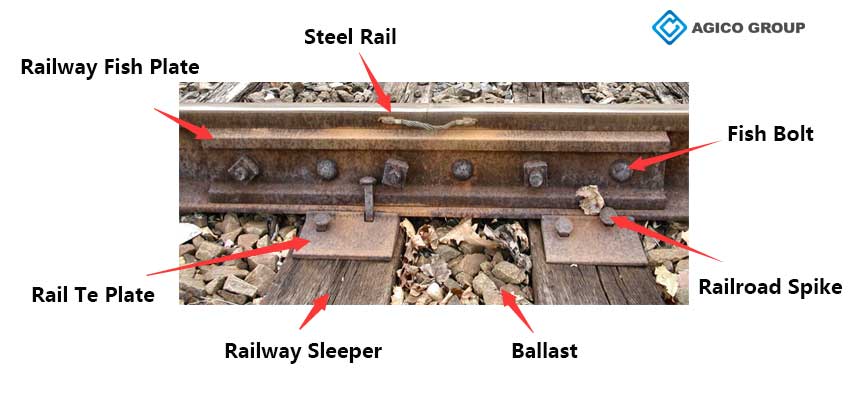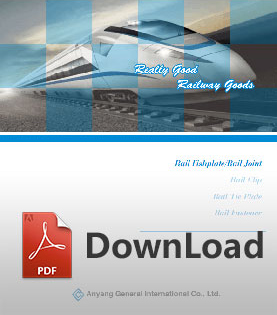A guide to railroad track

Railroad track, or track for short, it is mainly used in the railroad. Railroad track cooperates with switch, so that the train can run safely. As we all known, railroad track is made up of two parallel rails, steel rails are fixed on the railway sleepers and ballast is under the railway sleepers. Railroad track is consisting of rail brace, steel rail, railway fish plate, railway fasteners, and etc. Railroad track is subjected to a variety of static load and dynamic load from vertical and lateral. Railroad track transfer all loads to the subgrade through the sleeper and track bed.
Composition of railroad track
Railroad track components is composed of ballast bed, railway sleeper, steel rail, railway connection parts, railway fasteners, turnout and other parts of a railway track.
Steel rail

In the early, steel rail is cast iron rail, and then it later expended into I-shaped rail. In the 1980s, the standard gauge for most railways in the world was 1435 mm (4 ft 8 (1/2 in.)). Based on this standard, the narrower one is called narrow gauge railway, the wider one is known as broad-gauge railway. Today, steel rail can be applied into railway track construction in different countries. According to the different national standards, steel rails are classified into various standards, such as GB, BS, AMERA, JIS, DIN and etc.
Ballast bed

Ballast bed (track bed) is an important part of the track, and it is the basis of the track frame. Track bed usually refers to the ballast (ballast) cushion below railway sleeper that are laid on the surface of the roadbed. Track bed use gravel, pebbles, slag and other materials. In general, track bed at the bottom of the railroad track, which provides flexibility and drainage for railway track. Track can also be laid on the concrete foundation (common on the bridges), and even be embedded in the concrete.
Railway sleeper

Railway sleeper, also named railroad tie, it is one of railway components. Railway sleeper not only support the steel rail, but also maintain the position of the rail. Besides that, railroad tie can pass the huge pressure to the ballast bed. Normally, railway sleeper is buried in the track bed and laid laterally. Railroad tie is usually made of wood, concrete or steel.
Rail connection parts
Rail connection parts are used to connect two steel rails or rail and railroad sleeper. Rail connection parts include rail clip, railroad spike, railway fish plate, rail bolt and tie plate, etc.
Railroad spike

Railroad spike is applied to fasten steel rail to the railway sleeper and ensure the regular gauge between two rails. Typical railroad spike include common spike, dog spike and screw spike.
Railway fish plate and fish bolt

Railway fish plate and fish bolt are the common rail connection parts. They are used to maintain the strength and stiffness of the joint, so that the rail has a uniform elasticity. Most often, two railway fish plates are fixed on the either side of rail waist, and fixed by the fish bolt and spring washer.
Rail clip

Rail clip is a kind of railway fastener that fix rail on the railway sleeper. Railway fastener can resist the vertical rolling of wheel and lateral trust, and prevent longitudinal crawling of steel rail.
Rail brace

Rail brace is a component that install outside the steel rail. rail brace support the rail waist to resist the lateral wheel track force. In addition, rail brace prevent railroad spike from losing caused by canting of rail.
Ballast

Railway track ballast is laid on the subgrade and under railway sleeper. Ballast is used to hide the railway sleeper. According to the laying of the position, ballast can be divided into two types, top ballast and bottom ballast.
Ballast function as follow:- Bear the pressure from railroad tie, and transfer them to the subgrade evenly.
- Fix the position of the sleeper and maintain the correct line and slope for the track
- Exclude the rain around the railway sleeper, and prevent subgrade soils deforming because of wet.
- Increase the elasticity of the track, so that rail can be quickly returned to the original correct position after the rolling by the train.
- Weed control in the railway track.
In order to ensure the safety of high-speed railway operation, and improve the strength of the roadbed, ballastless railway track is widely applied in the modern railway track. ballastless track can reduce the ballast clean and maintenance, and use concrete foundation to replace ballast, railway sleeper and subgrade. Ballast and ballastless railway track are the two typical railroad tracks.
As a reliable support for train, railroad track bear the load from steel rails and keep them in right place. In a word, the railway track makes great contribution to the train safety.
Talk to us at facebook!
- Rail Fasteners
- Rail Joints (Fishplate)
- Steel Rail and Sleeper

